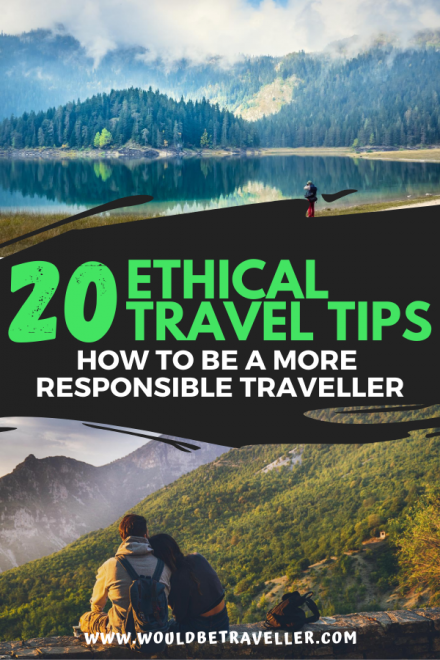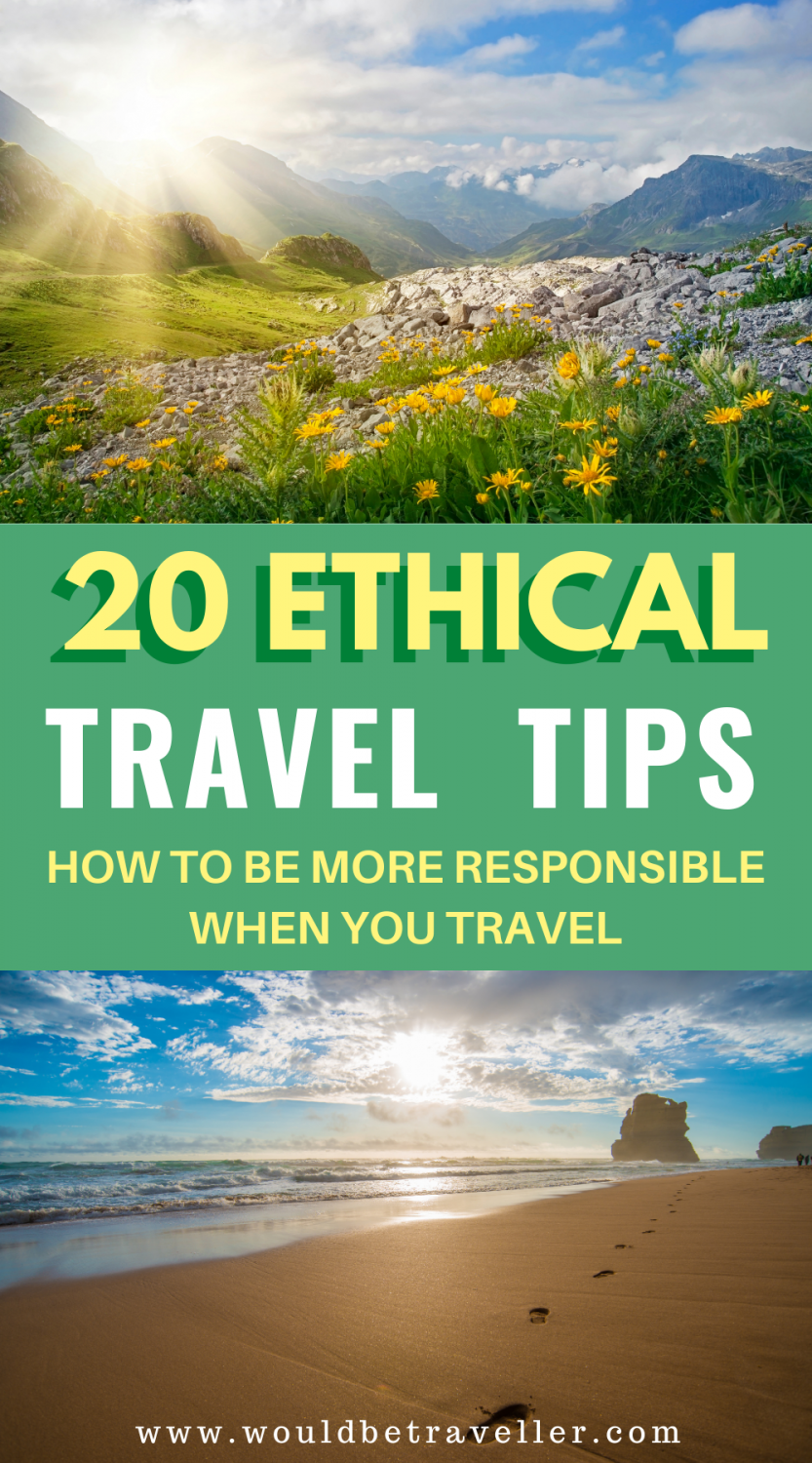It’s now more important than ever for us to learn how to be a responsible traveller and reduce our impact on the environments, the communities and the wildlife we come into contact with. After all, with the world being more vulnerable than ever, we should be able to see things when we travel, but we must also do our best not to harm them. But how? With the ethical travel tips in this post, you’ll find out what it means to travel ethically, and how to be a responsible traveller too.
1. Be prepared to educate others
Education is perhaps the most important aspect of ethical travel. A few years ago, no-one really knew what it meant to be travel ethically. We didn’t understand that riding elephants was harmful, or that buying brand new toiletries for each new destination may have been polluting the planet beyond repair. We didn’t always think twice before staying in a large all-inclusive resort or eating at McDonalds without considering the lady down the street who had just opened a new restaurant to support her family. But that’s okay, because now we know better and can help those that don’t. Thanks to the irresponsible behaviour of some tourists becoming widespread news and the emergence of ethical travel blogs like this one, information on how to become a more responsible traveller is now widespread. Just remember that not everyone has access to this same information. That’s why it’s important to politely speak up if you see another tourist dropping litter on the floor, or report incidents where you see a camel handler mistreating one of its animals. They won’t know any better unless we tell them.
2. Use ethical tourism companies
Not all tour operators place the same focus on ethical travel, so it’s important to do your research before giving away your hard-earned cash to just anyone. Intrepid Travel’s tours are designed with its responsible travel policy in mind, meaning that guests will be encouraged to support local companies and people as well as respect the destinations they visit. G Adventures has a similar policy, so by travelling with these tour operators you’ll be helping promote ethical travel. Try to avoid companies that offer unethical wildlife encounters as part of their tours, or who seek to make profit by exploiting children during orphanage visits. You can never really be sure of their intentions in these situations, and it’s best to support via charitable efforts instead. You could also consider slow travel companies, which are committed to supporting local communities and producers.
3. Visit lesser-known attractions and tourist sites
The most popular attractions in a destination are usually crowded with tourists. By visiting these places, you may be contributing to their monopoly over other lesser-known sights, as well as putting strain on the transport to reach them. Instead, try exploring more off-the-beaten-track destinations to spread the wealth. You never know what hidden gems you might stumble across when you throw away your guide book.

4. Be conscious of what you are eating
The food you eat when travelling can be just as important as the transport you use when it comes to ethical travel. We all have our own ways of eating more ethically: for some, this is becoming vegetarian or vegan. For others, it’s making sure you seek out food sourced locally or from ethical farms. But if you’d prefer other ways of eating ethically, consider buying from local markets and restaurants to reduce your use of plastic packaging and to support local businesses. No matter where you buy your food, try not to order more food than you need just because it’s cheap or because you want to try everything. Wasted food is harmful to the environment and disrespectful to the people that cooked it for you. Start by ordering a few small dishes because you can always order more if you’re still hungry later.
5. Avoid all-inclusive resorts
While it can be tempting to book a holiday to an all-inclusive resort, I’d urge you not to due to the sheer amount of waste they produce and their monopoly over local businesses. All-inclusive resorts promote a culture of waste. You can eat and drink as much as you want, often to excess, and even if you don’t eat it, the food is still going to be prepared and wasted. The resorts also produce an incredible amount of plastic, from the plastic cups the drinks are served in to the straws they readily give out. All this single-use plastic is damaging our environment, so try to stay in smaller, independent hotels with eco-friendly policies.
6. Do not support unethical animal encounters
Now a topic that’s very close to my heart is the ethical treatment of animals in tourism. The sad truth is that there are still a number of attractions across the world that mis-treat wild animals for profit. In Asia, some companies have been known to drug tigers in order that tourists can interact with them in cages. Others may train elephants to paint and dance for tourist enjoyment. The Pinnawala Elephant Orphanage claims to save stray baby elephants, orphaned in the wild. It was set up with strong foundations, but staff have since continued to breed elephants in captivity, chain them up and encourage tourists to take selfies with them for money. In Africa, captive breeding farms exist where lions, leopards and cheetah are forced to accompany visitors on walks and pose with them in photos. Once they’re considered too big to be cute, they’re shipped off to canned hunting where wealthy tourists pay to shoot them in an area from which they can’t escape. Thanks to the growing understanding around responsible travel, there are many more ethical animal attractions and opportunities to volunteer with wildlife available now. However, if you’re in any doubt as to the intentions or practices of an animal encounter, it’s safer not to take part.
7. Go on safari to see animals in the wild
No-one can deny the best way to see animals is in the wild where they belong. While zoos may be an easy way to keep the kids entertained or to see animals you might not otherwise see in the wild, please do your research first to check the animals are well-treated.

Instead, you could opt to visit private nature reserves and national parks that have a vested interest in conservation. That way, if you come across an animal in the wild, it feels much more rewarding to know that the animals could run away and hide, but they’ve decided to stay and let you observe them. Plus, in most national parks, you’ll need to pay extra park fees to support the work of rangers and vets that help to prolong the existence of many endangered species. What’s not to love?
8. Do not ride animals
It’s well-known that it’s unethical to ride elephants, but what about other animals? I’m a firm believer that animals should be given a choice as to whether they want to interact with you or not. Riding them takes away this choice, so I would rather not do it. It still surprises me to see donkeys, camels and even horses being ridden by perfectly fit and healthy tourists just for fun. Even if these animals are considered ‘working animals’, you can never really be sure how well they’re treated and how many other tourists they’ve had to carry before you that same day. Being ridden puts an enormous amount of both emotional and physical stress on the animal, and do you really want to be the tourist that broke the camel’s back?
9. Remember the marine life
Just like with land-based animals, it’s best to observe marine life from a distance rather than swimming with them in captivity. When heading out on a whale watching excursion, choose a company with good reviews, clear policies and experienced guides that treat whales with respect. If you enjoy diving and snorkeling, there are some easy ways to become a more environmentally friendly diver. Remember to avoid touching corals with any part of your body, and never remove or leave anything behind as it could cause huge damage. All underwater creatures are wild animals, so try to stay at a safe distance so as not to cause distress. The oceans are already beautiful – let’s keep them that way!
10. Purchase only cruelty-free products
If you’re an animal lover, pay attention to the products you use when you travel to make sure they don’t cause unnecessary harm. To be a more cruelty-free traveller, look for the little bunny logo on health and beauty packaging or check out Cruelty Free Kitty – the best resource for brands and products that are cruelty-free. Remember that some souvenirs also directly involve the death of animals in their production. Did you know that silk is made by boiling silk worms alive? Or that pearls are only created when an oyster secretes a stress hormone from which it may not survive? So next time you’re shopping for souvenirs, have a little think about where it came from first.
11. Use less plastic when you travel
We all know that the sheer amount of single-use plastic is damaging the environment. Yet, it’s surprisingly easy to reduce your use of plastic when travelling if you use these tips:
- Take a reusable water bottle with a filter, that will allow you to drink tap water anywhere in the world. I love my Water-to-go bottle, and you can get one for 15% off by using the code WBT15
- Invest in shampoo bars and solid deodorant, or bring your own toiletries in re-usable toiletry bottles
- Carry a couple of reusable bags or totes on day trips to hold food and souvenirs. Refuse plastic bags from market stalls and see how much you can carry in your hands!
- Buy a KeepCup instead of throwing away a disposable cup each time you drink a coffee
- Just say no to straws or buy a reusable one and carry it with you in your backpack
- Swap your plastic toothbrush for an eco-friendly alternative, such as those made from bamboo
- Use eco-friendly sanitary products like cups or period pants, or buy bio-degradable natural tampons
- Buy an electric razor instead of disposable blades. I love my Philips SatinShave Prestige but there are plenty of alternatives available
Though most alternatives to plastic do cost a little more than single-use ones, think of them like an investment in both your bank balance and the environment 🙂
12. Stay in eco-friendly accommodation
Many forms of accommodation are growing more conscious of their impact on the environment. Some have solar panels, use 100% renewable energy and have strong recycling programmes. Others re-use shower water to water the plants, offer free bike rental and commit to supporting local breakfast suppliers. It’s much better to support these kinds of initiatives than all-inclusive resorts or large hotels that give no thought to the environment. To find your next eco-friendly accommodation, browse Booking.com and look out for places that have sustainability policies or hold ‘green’ status on other sites.
13. Use public or shared transport where possible
Instead of hiring a car to reach your destination, try finding public transport, a shared minibus or tour that will take you. Not only will this usually be cheaper, it also means you’re reducing the amount of cars on the road and thereby reducing carbon emissions.

14. Walk more
Walking is a fantastic way to see the world. Of course, it’s not feasible to walk everywhere all of the time, but if you have a choice between taking a 5 minute subway ride or walking for an hour, walk every time! Plus, walking is so much better for the environment than any other form of transport.
15. Consider Carbon Offsetting programmes
Carbon offsetting schemes have grown in popularity over the past few years. Many schemes take donations and then plant trees across the world on your behalf. Through these schemes, you are ‘repaying’ the carbon you’ve helped cause by flying, using electricity or even buying products. You can offset your carbon once a year by counting up all your air miles, or after each and every trip. Carbon Footprint has a calculator where you can work out all your travel and household emissions for the year. It’s then possible to offset those emissions by choosing between the different off-setting options, which include planting trees in the UK, contributing to reforestation in Kenya or even Carbon Footprint’s global portfolio.

When we travel, it’s important to promote the positive social impact of tourism and minimise (as much as possible) the negative.
16. Shop and eat at local places
There are many benefits to shopping and eating at independent shops, markets and restaurants. More often than not, the quality of locally produced food and products is much higher than mass-produced. The food especially is more authentic and unique, rather than the famous golden arches. But most of all, by shopping and eating at local places, you’re supporting that country and the people that have put in the hard work. Think of it like this – how much better does it feel, to imagine you’re helping a local restaurant owner’s daughter afford to go to school, rather than helping to fund an international corporation owner’s newest car?
17. Treat people the way you want to be treated
When travelling, you’ll come into contact with hundreds of different people, from the cabin crew on your plane, to hotel staff in your destination. It’s important to remember that every single person you meet is a human being, and should be treated as such. Smile and say hello, ask them how they are, say thank you if they do something to help and ask their permission before taking their photo.
18. Do not expect people in other countries to speak your language
Native English speakers are often guilty of assuming that everyone speaks our language when abroad. Yet, if you travel to very off-the-beaten track destinations, they may have never even spoken to a tourist, let alone heard your language. It shows a deep respect for the country you’re visiting (and its people) if you attempt to learn at least a few words of theirs. So rather than using hand gestures and raising your voice, you could actually communicate with the people you meet. Thanks to the plethora of apps and translation websites available now, it’s easier than ever to learn a new language! Duolingo is just one example of a free app that covers loads of languages, from French and Spanish to Vietnamese and Hindi. The app makes learning languages fun, meaning you can pick up the basic greetings, pleasantries and other essential phrases with minimal effort.

19. Respect local traditions and etiquette
There are unique customs and traditions in every country and it’s important to respect them all. From chopstick etiquette in Japan, to being conscious of where and when you eat in Muslim countries during Ramadan, following the traditions demonstrates huge respect for the country you’re visiting. Pay attention to dress codes, especially when visiting religious buildings. If in any doubt, do as the locals do and follow the instructions given to you by staff. It also pays to do your research before you go.
20. Learn the tipping culture in your destination
Remember what works in one country doesn’t necessarily work in another. For example, tipping at all in China can be seen as rude and disrespectful, and could prompt your waitress to chase you down the street to give you the money you ‘forgot’ (I’m speaking from experience). Yet, tipping 10-20% of the bill in Mexico is essential when you’ve experienced good service, and could cause your waiter to chase you down the street if you haven’t given enough. The point is, make sure you’re following the right advice for the country you’re in, not the country you’re from. This will help to avoid embarrassment and potentially upsetting your wait staff.
***
There are hundreds of definitions of ‘ethical travel’ but one thing seems to be common across them all. Ethical travel means travelling with respect: respect for the people, the environment, the wildlife and the destination you come into contact with. Other than the photographs you take, there should be no other trace that you were ever there.
***
Do you have any other ethical travel tips to share? Please do leave a comment below as I’d love to hear them! If you’re committed to travelling more ethically, pin this post for later >>




